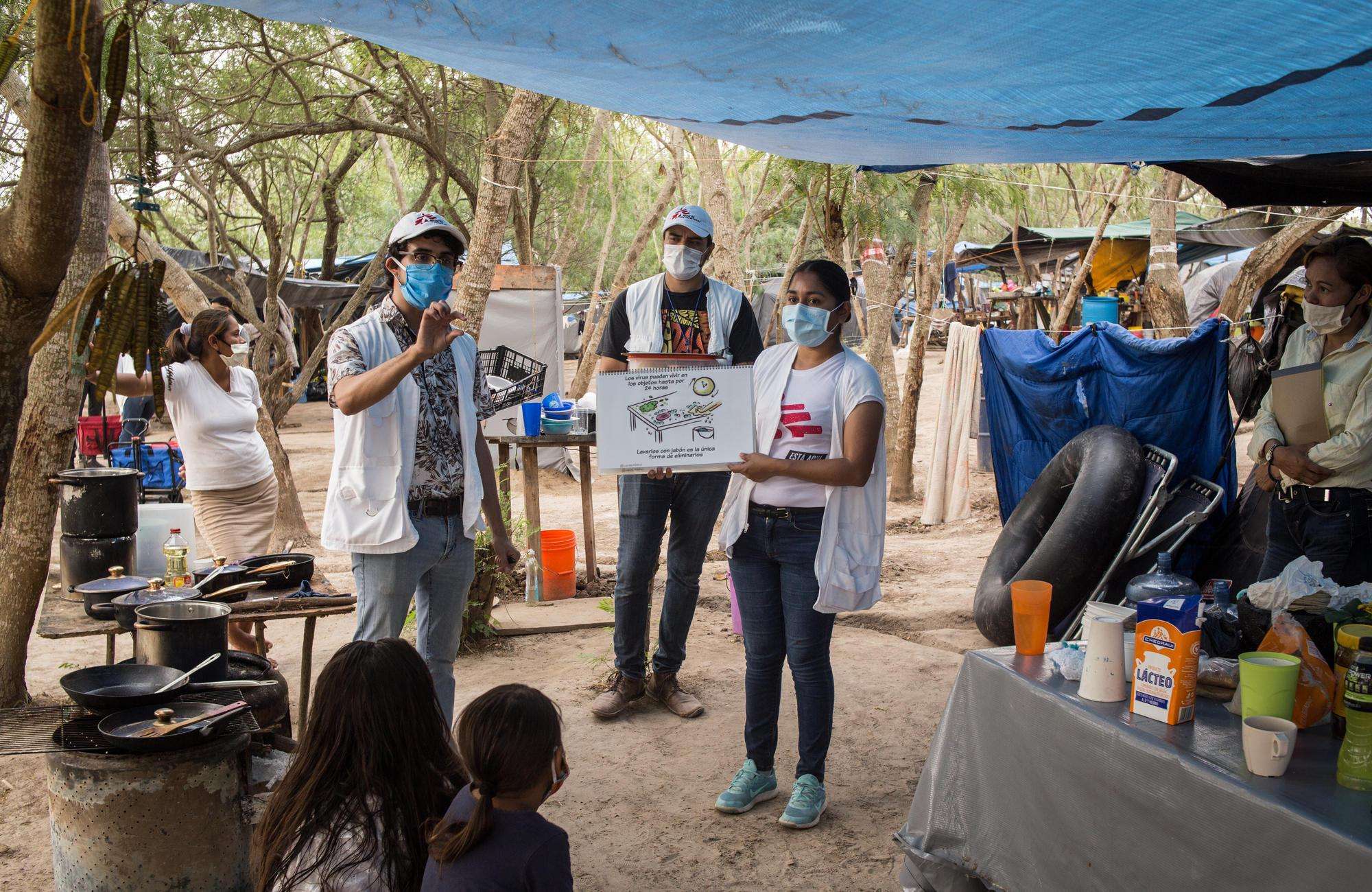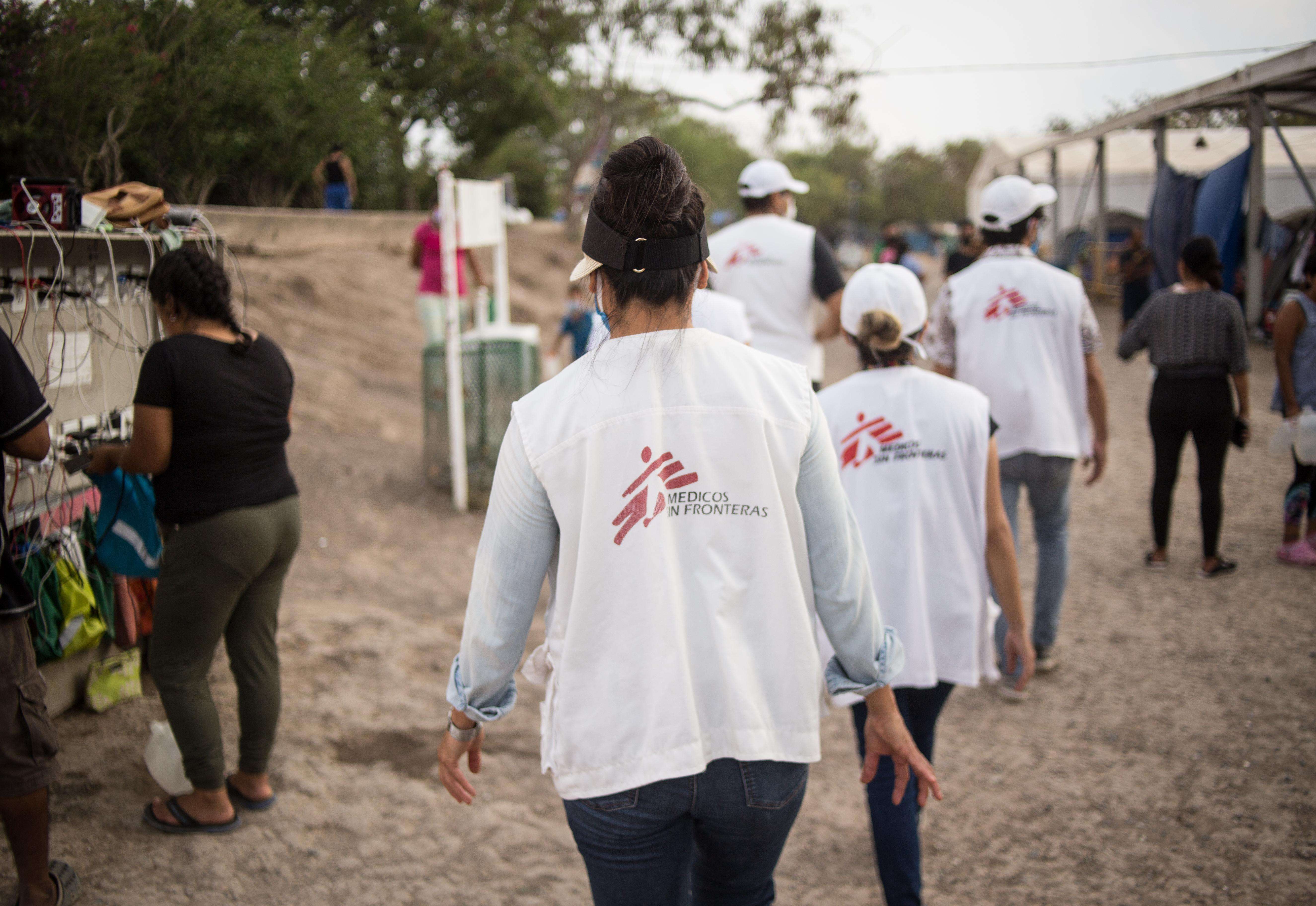Doctors Without Borders Médecins Sans Frontières (MSF) submitted the following comment in opposition to the rule proposed by the US Department of Justice (DOJ) and the Department of Homeland Security (DHS) and posted in the Federal Register on July 9, 2020: “Security Bars and Processing”— RIN 1615-AC57 / USCIS Docket No. 2020-0013; RIN 1125-AB08 / A.G. Order No. 4747-2020. Individuals and organizations can submit a public comment here by August 10.
Doctors Without Borders/Médecins Sans Frontières (MSF) submits this comment to object to a new rule proposed on July 9 that uses public health concerns as a pretext to bar asylum seekers from the United States. As an international, independent medical humanitarian organization, MSF is asking the Department of Homeland Security (DHS) and Department of Justice (DOJ) to withdraw the proposed rule in its entirety.
Through this new rule, the Trump administration is cynically instrumentalizing the COVID-19 pandemic to undermine the US asylum system and evade its domestic and international legal obligations. The US is perfectly capable of simultaneously preserving fundamental protections to asylum seekers fleeing persecution and violence and safeguarding public health. The lives and safety of thousands of people depend on withdrawing this rule.
MSF provides medical assistance to people affected by conflict, epidemics, disasters, or exclusion from health care. Since 2012, MSF has provided medical and mental health care to thousands of migrants and asylum seekers on the migration routes through Mexico to the US. A large percentage of the patients we have treated along the route have fled their home countries because they fear for their lives. They have a right to be heard and to be given a chance to find safety.
The rule directly threatens the lives and health of many of our patients and thousands of people fleeing violence. The time for consideration of public comments is insufficient for a rule of this length, complexity, and gravity—especially during a pandemic.
The proposed rule builds on years of regulations, proclamations, and executive orders issued by the Trump administration in an effort to deliberately dismantle the asylum system and make it extremely difficult for people fleeing violence and persecution—especially those fleeing from Central America—to seek safety in the US.
The proposed regulation would characterize asylum seekers as threats to public health, routinely block them from asylum and other humanitarian protections in the US, and deport people waiting for their asylum hearings. The US would be sending vulnerable people seeking safety back to face the threat of extreme violence, persecution, and other serious harm.
As a humanitarian organization providing medical care in crisis zones around the world, MSF has for years documented testimonies and medical data showing that many people on the migration route through Mexico are fleeing extreme violence and direct threats to their lives and the lives of their family members. We see large numbers of patients from El Salvador, Guatemala, and Honduras, in particular. The high levels of violence in these countries are comparable to what we have witnessed in war zones where MSF has been working for decades—and this insecurity is a major factor fueling migration north to Mexico and the US.
For the past four months, the Trump administration has used COVID-19 as a pretext to evade domestic and international legal obligations and slash protections for asylum seekers and unaccompanied minors at the border. In its latest proposed rule, the administration goes a step further to eliminate humanitarian protections for most people seeking safety in the US, relying on specious public health contentions with no basis in medical fact. Sections 208.13/1208.13 and 208.16/1208.16 create extraordinary public health bars to asylum and withholding of removal protections that will return asylum seekers to persecution. These sections would grant Department of Justice (DoJ) and Department of Homeland Security (DHS) officials sweeping authorities to deny humanitarian protection to and deport those who:
- exhibit “symptoms consistent with being afflicted with any contagious or infectious disease”;
- have “come into contact with such a disease”;
- or come from a country or area where such disease is “prevalent or epidemic”.
The expansive rule singles out asylum seekers as vectors of a host of diseases—including COVID-19—and empowers immigration authorities to ban from protection those who appear to be infected and those transit through countries where the disease is prevalent, without regard to actual exposure. The rule could also apply to individuals in the US who have “come into contact” with a covered disease, potentially exposing asylum seekers broadly and asylum-seeking health workers specifically to denial of protection and deportation.
In addition to being categorical, discriminatory, and punitive these measures are counterproductive. MSF has responded to countless disease outbreaks around the world for almost 50 years, and we know that public health measures work best when they are inclusive. They fail when vulnerable people, like migrants and asylum seekers, are excluded.
The Trump administration must use evidence-based measures to bring infectious disease outbreaks under control while enabling the safe processing of asylum seekers. Currently, US measures such as the detention and deportation of asylum seekers risk furthering the spread of COVID-19 across Latin America and the Caribbean and compounding what is already an immense public health crisis in the region. These dangers are acute given the expanding community spread of COVID-19 within the US. Immigration detention centers in particular have become ideal breeding grounds for COVID-19, with infection rates significantly higher than those across the US. Continuing deportations of migrants and asylum seekers from the US to countries with fragile health systems—including Mexico, Honduras, El Salvador, and Haiti—are directly contributing to the regional spread of the disease.
The proposed rule would also likely deny humanitarian protections for thousands of asylum seekers blocked by this administration’s policies and left trapped at the US southern border. These individuals have been forced to wait for many months, and in some cases for more than a year, in extremely poor and violent conditions due to the administration’s metering system at ports of entry and its Migration Protection Protocols (MPP) program. In September 2019, 43.9 percent of MSF’s patients sent to Mexico under the MPP program in Nuevo Laredo (18 of 41) had recently been kidnapped and an additional 12.2 percent (5 of 41) had been victims of attempted kidnapping. In October 2019, the percentage of kidnappings among those received under the MPP program increased to 75 percent (33 of the 44 new patients). The situation of these asylum seekers—many of whom live in overcrowded encampments and shelters along the border—has become even more perilous with the spread of COVID-19 in Mexico.
The US has the resources and expertise to be a global public health leader while protecting the lives of individuals seeking safety here. This proposed rule on security bars and processing would do further damage to the asylum system in this country and increase the suffering of vulnerable people. The rule must be withdrawn.






